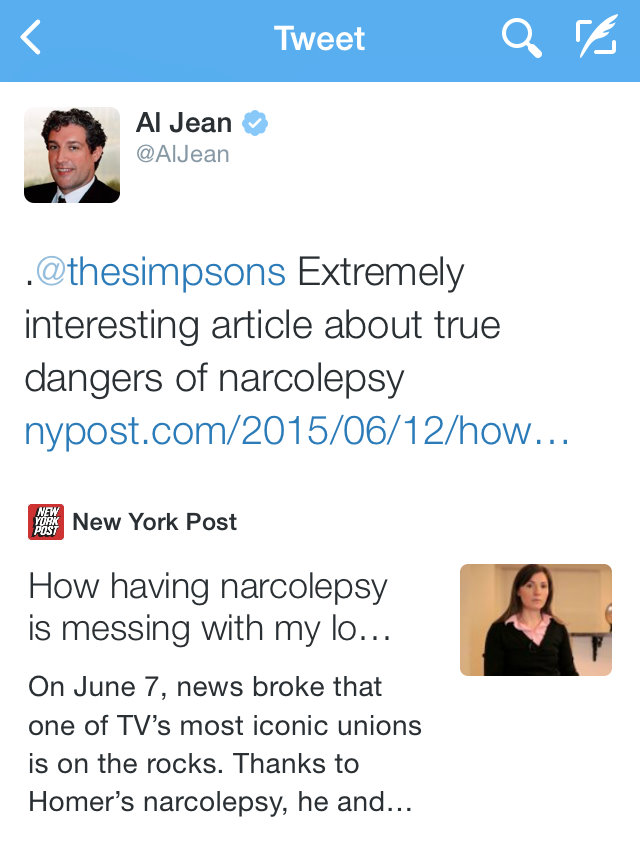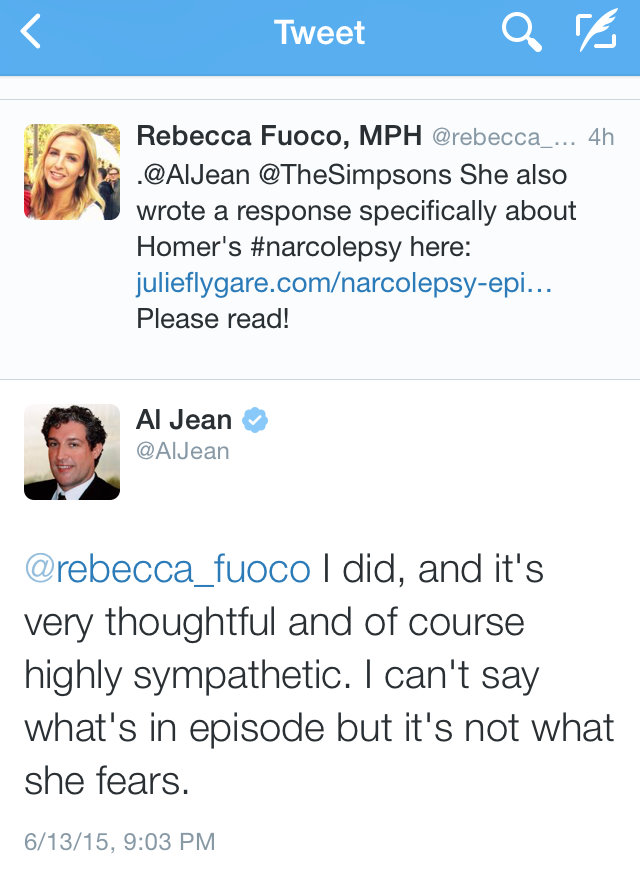Update: The Simpsons Executive Producer Responds
Over the weekend, the Executive Producer of The Simpsons, Al Jean, corresponded briefly regarding the Homer Simpson narcolepsy news via Twitter.
First, he tweeted “.@thesimpsons Extremely interesting article about the true dangers of narcolepsy” to share the NY Post article on my experience with narcolepsy (re-published from Women’s Health Magazine). View the tweet here and retweet!
I responded, along with Project Sleep’s blog editor, Rebecca Fuoco. He responded to Rebecca’s tweet stating that he had read my blog post about Homer Simpson, “it’s very thoughtful and of course highly sympathetic. I can’t say what’s in the episode but it’s not what she fears.”
Al Jean’s interactions were very kind and I’m encouraged. Of course, I would love to learn more about how narcolepsy will be portrayed and I hope to see a continued dialogue as the air date approaches on Sept. 27.
I can’t thank you all for your support. This past week has been insane – there was one day that I drove to work on the phone with the Women’s Health Magazine reporter, then called a few of the scholarship recipients from the parking lot at work, then went to my full-time job at City of Hope, came home to write the Homer post and pack for Sleep Walk Dallas/Fort Worth. I wish Homer could’ve picked a different week to get narcolepsy. 😉
That’s all for now!


Julie my brave gal,
I’ve been reading your stuff on this & am so proud of you.
Keep on keeping on. You’re one of a kind.
Karen
One of kind. Julie is an atypical type 1 narcoleptic who must respond very well to Xyrem, or is on and can tolerate high doses of Adderall without developing tolerance or cardiovascular problems.
The problem is Julie makes narcoleptics who may not tolerate or respond to the medications prescribed for it look lazy, so maybe she’s the one misportraying typical narcolepsy and doing harm, not the Simpsons. Some of us have heart problems with Adderall (tachy, arrhythmias, etc.). For half of us, Xyrem does nothing. A third of us develop an acute tolerance to Adderall. Do you really using speed every day for the rest of your life is healthy Julie?
We don’t need awareness — we need better and safer treatments. How is Julie helping us by getting up on stage and appearing fully alert without telling audiences that she’s jacked up on speed, or takes the date rape drug every night … TWICE! Even GHB addicts cringe at that thought.
M. Briganti,
How can you say that those of us with narcolepsy don’t need awareness? Narcolepsy is an extremely undiagnosed illness, many doctors don’t even know the classic signs and symptoms. The time between the onset of symptoms and being diagnosed is years on average, because narcolepsy is generally not considered.
Julie is atypical considering, according to her, she has experienced all of the symptoms of narcolepsy. If you read her blog you would know that she has gone through many different treatments to find what works for her. She has also said that narcolepsy is a not cookie cutter, and that her experience is not everyone’s experience.
I can feel the jealousy seething from your post when you’re implying those of us who take Xyrem or a stimulant are “jacked up on speed”. Just because a medication didn’t work for you doesn’t mean you should insult those of us it does work for.
I personally find Julie inspiring. She has the courage to go on camera and talk about a very personal illness and newsflash, most of us with narcolepsy who do work have times where we have to appear alert when we’re actually extremely exhausted.
Flygare’s account was interesting in that her descriptions of the symptom of her narcolepsy were in many ways parallel to mine, however, even though I genetically test positive for narcolepsy/cataplexy I have as yet to be diagnosed with narcolepsy as I also have a very long circadian cycle that seems to require 15-20 hours 0f sleep to get a refreshed awakening only to last 15 hours when I am awake or not so awake. Her cataplexy seemed to evolve faster in a severe form and full collapses, mine seem to come on when I exercising and having positive attitude or in the middle of a stressful conversation. As a result I would suddenly fly off the treadmill or collapse when feeling I had done well and decide to step off the tread mill or dismount from the bike or loose my orientation as I step through a doorway. Also, when the weather took a severe change such as a deep wet trough moving over San Francisco ( where at an import meeting at the EPA I found myself barely able to stand, shaking so severely my whole body become drenched as I tried get my muscles in my knees and hips function, embarrassingly I had to turn the meeting over to one of our other team members and I slept, these guys got me back to the hotel where I stayed and extra night until the storm passed and I could stand without falling). Eventually, any small weather event made me unstable and my brain demanded that I sleep or fall. Other issues were falling asleep in meetings where I had huge management responsibility, falling asleep on the freeway, needing naps incrementally through the day so I could be lucid. My writing skills and oral communications diminished the more I fought the sudden collapse into sleep (eventually I got to the point I was exhausted I could not write anything that made any sense much of the time).
Flygare’s account of the onset of narcolepsy was rapid, seemingly out of the blue, for me these symptoms appeared rather slowly and sporadically making it difficult to realize something was amiss. I am 69 years of age and Flygare’s account is the first of I have read that addresses the condition from a personal experience and it helped me to read it and realize these symptoms are shared by others and were not imaginary. Today I address the problem with modafinil 700mg each morning, as staying fully awake and alert suppresses most symptoms such as cataplexy, but a strong weather change, regardless of how much modafinil I have ingested, causes descent into prolonged sleep and loss of muscle tone, and all the other symptoms emerge to the surface. After working with the University of Colorado Medical School and seven days at Mayo Clinic plus years of working with good MD’s here in Boulder Colorado I still don’t have a decent diagnosis, but may be getting closer thanks to Flygare memoir, well anyway I hope so. The book offers a lot of hope, leaving no room for criticism.